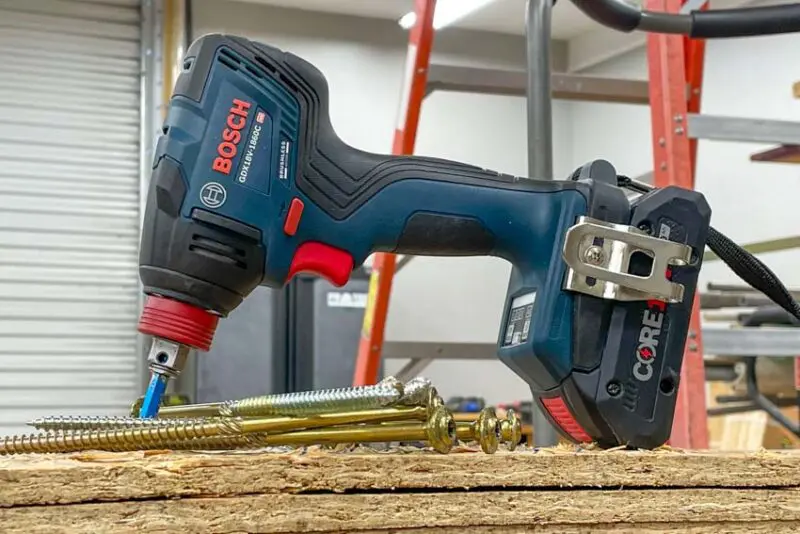Today we turn our attention to the affairs of the European continent with two brands that trace their roots to Germany and Lichtenstein. In this Bosch vs Hilti impact driver head-to-head review, we’re taking a closer look at recent upgrades for both brands. For Bosch, it’s the brushless Freak (GDX18V-1860CN) in the strongest form we’ve seen so far. For Hilti, we’re seeing what the shift over to the Nuron system is doing for the performance and design of the SID 6-22.
We discovered quite a bit in our testing, but the way we prioritize those findings isn’t necessarily the way you do. So take a look at our results and drop a comment below to let us know which of these two impact drivers is best for the way you work!
Check out our best impact driver recommendations for the year!
Bosch Vs Hilti Impact Driver Specifications
We can glean some things just by taking a look at basic specifications. Here’s what we learned before pulling the trigger:
| Bosch GDX18V-1860CN | Hilti SID 6-22 | |
| Top Speeds | 1100/2300/3400 RPM | 1800/2700/3600 RPM |
| Max Impact Rate | 4100 IPM | 4250 IPM |
| Max Torque | 1860 in-lbs | 2655 in-lbs |
| Head Length | 5.8 in | 5.4 in |
| Bare Weight | 2.6 lbs | 2.2 lbs |
| Weight w/4.0Ah Battery | 3.8 lbs | 3.9 lbs |
Bosch Vs Hilti Impact Driver Test Results
Bosch and Hilti use different battery voltages. Bosch sticks with a more traditional 18V system based on 5-cell sets. While it does have standard batteries available, the advanced Corre18V pack is what we recommend and use for Bosch cordless tools. We used the compact 4.0Ah Coer18V battery for these tests.
Hilti uses a 22V battery (technically 21.6V) based on 6-cell sets. Every battery in the Nuron line is what we consider advanced, though not all of them are appropriate in size and weight for an impact driver. We used the 4.0Ah battery for our testing with Hilti, which is the larger of the two batteries we recommend. You could get away with the 8.0Ah battery if you really wanted to, but it turns a compact tool into a bulky one.
We ran three different performance tests to see what these impact drivers can do. The first is a medium-load test driving a 8-inch x 1/4-inch GRK Fasteners RSS screw into stacked OSB subfloor. The result is the average of three tests.

The second test is timed to see how far each model can drive a 10-inch x 1/2-inch lag screw into the same material in 30 seconds. The result is the average of how much of the screw remained proud in three tests—less is better.

The third test is to see how long it takes to break loose a nut that is set to 150 ft-lbs (1800 in-lbs). The result is the total time added together for 5 bolts.

| Bosch GDX18V-1860CN | Hilti SID 6-22 | |
| RSS Screw Average | 12.8 seconds | 14.6 seconds |
| Lag Screw Average | 4.6 inches | 4.0 inches |
| Nut-Busting Total | 8.4 seconds | 8.0 seconds |
What if you’re using Bosch’s 6.3Ah Core18V batteries? We tested those, too! What’s interesting is that these results indicate that a 1P pack with 21700 cells is an advantage over a 2P pack with 20700 cells. Of course, it’s very possible Bosch upgraded more than just the cells.
| Bosch w/4.0Ah Core18V | Bosch w/6.3Ah Core18V | |
| RSS Screw Average | 12.8 seconds | 13.3 seconds |
| Lag Screw Average | 4.6 inches | 4.4 inches |
| Nut-Busting Total | 8.4 seconds | 12.6 seconds |
Bosch Vs Hilti Impact Driver Highlight Features
Bosch GDX18V-1860CN

- Brushless motor
- 3 standard speeds and 2 assist modes
- Hybrid 1/4-inch hex and 1/2-inch square drive
- Smart capabilities by adding the Bosch Connected Module
- Foot-mounted LED light
One thing worth pointing out is that if you don’t need Bosch’s hybrid 2-in-1 drive, you can get the same tool with a standard 1/4-inch hex collet. It’s noticeably more compact and you can find it as model GDR18V-1860CN.
Hilti SID 6-22

- Brushless motor
- 3 standard speeds
- Advanced Nuron data and diagnostic collection
- LED halo surrounding the collet
- One-hand bit insertion
Bosch Vs Hilti Impact Driver Price
| Bosch GDX18V-1860CN | Hilti SID 6-22 | |
| Bare Tool | $99.00 | $199.00 |
| Compact Battery Kit | $299.00 (2 x 4.0Ah) | $514.75 (2 x 4.0Ah) |
| Warranty | 3 years | 20 years |
So who’s your winner? Let us know in the comments below—bonus points for telling us why!



